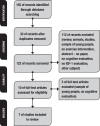Physical exercise, IGF-1 and cognition A systematic review of experimental studies in the elderly
- PMID: 29988330
- PMCID: PMC6022990
- DOI: 10.1590/1980-57642018dn12-020003
Physical exercise, IGF-1 and cognition A systematic review of experimental studies in the elderly
Abstract
One of hypothetical mechanisms related to cognition is exercise-induced IGF-1.
Objective: The aim of this study was to analyze the effects of exercise on IGF-1 levels and cognition in the elderly.
Methods: The article searches were conducted on Pubmed, Web of Science, PsycINFO and Scielo databases and reviewed according to PRISMA guidelines. The inclusion criteria were: [1] original articles published up to 2017; [2] samples including elderly; [3] protocols including physical exercise; [4] longitudinal studies having exercise as main outcome; [5] assessment of IGF-1; [6] cognition assessment.
Results: Seven studies were included in this review. Three of the studies showed an exercise-induced increase in IGF-1; three found stable IGF-1 levels and one found a reduction in IGF-1; with and without improvement in cognition.
Conclusion: Disparities in the type of physical exercise, protocols and samples under different conditions hinder the establishment of a consensus on IGF-1, cognition and physical exercise.
Um dos mecanismos hipotéticos relacionados a cognição é o IGF-1 induzido pelo exercício.
Objetivo: O objetivo deste estudo foi analisar os efeitos do exercício físico nos níveis de IGF-1 e na cognição de idosos.
Métodos: A busca de artigos foi conduzida nas bases de dados Pubmed, Web of Science, PsycINFO e Scielo, revisada de acordo com as recomendações do PRISMA. O critério de inclusão adotado foi: [1] artigos originais publicados até 2017; [2] amostras incluindo idosos; [3] protocolos que incluíssem exercício físico; [4] ensaios randomizados, não randomizados, controlados e não controlados; [5] avaliação dos níveis de IGF-1; [6] avaliação cognitive.
Resultados: Sete estudos foram incluídos nesta revisão. Três deles mostraram aumento de IGF-1 por meio do exercício; três verificaram manutenção nos níveis de IGF-1 e um, verificou redução de IGF-1; com e sem melhora cognitive.
Conclusão: Diferenças nos tipos de exercício, protocolos, amostras em diferentes condições dificultam o estabelecimento de um consenso em relação ao IGF-1, cognição e exercício físico.
Keywords: cognition; exercise; older adults.
Conflict of interest statement
Disclosure: The authors report no conflicts of interest.
Figures
References
-
- Kramer AF, Erickson KI. Effects of physical activity on cognition, well-being, and brain: Human interventions. Alzheimer’s Dement. 2007;3(2) suppl.:45–51. - PubMed
-
- Phillips C, Baktir M Akif, Das D, Lin B, Salehi A. The Link Between Physical Activity and Cognitive Dysfunction in Alzheimer Disease. Phys Ther. 2015;95(7):1046–1060. - PubMed
-
- Deslandes A, Moraes H, Ferreira C, Veiga H, Silveira H, Mouta R, et al. Exercise and mental health: Many reasons to move. Neuropsychobiology. 2009;59(4):191–198. - PubMed
-
- Llorens-Martín M, Torres-Alemán I, Trejo JL. Growth factors as mediators of exercise actions on the brain. Neuro Molecular Med. 2008;10(2):99–107. - PubMed
-
- Cotman CW, Berchtold NC, Christie LA. Exercise builds brain health: key roles of growth factor cascades and inflammation. Trends Neurosci. 2007;30(9):464–472. - PubMed
LinkOut - more resources
Full Text Sources
Other Literature Sources
Miscellaneous


